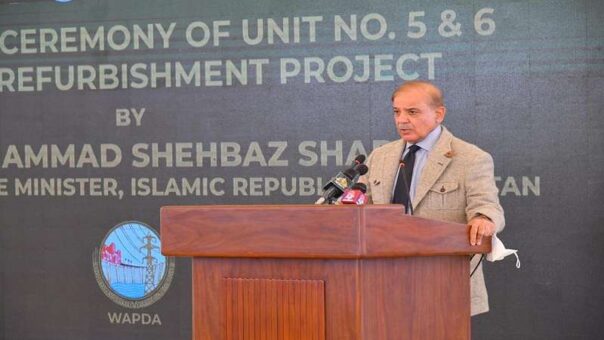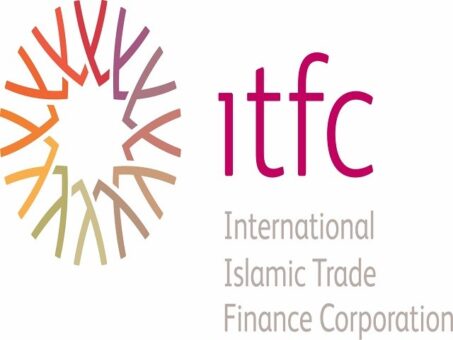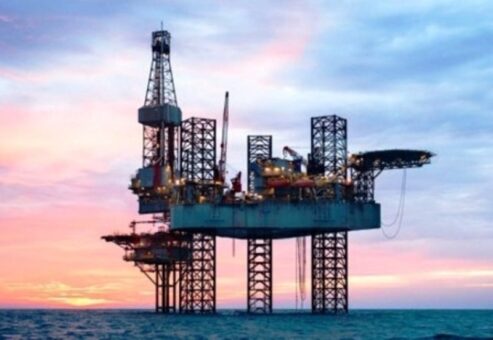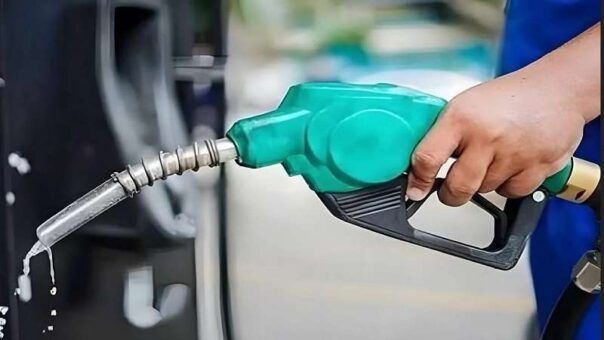Islamabad, July 20, 2023 – Pakistan’s import bill for petroleum products witnessed a significant decline of 37 percent during the fiscal year 2022-23, as per official statistics released by the Pakistan Bureau of Statistics (PBS).
(more…)Tag: oil import bill
-

Pakistan unable to bear heavy energy import bill amid challenges to economy: PM
MANGLA: Prime Minister Shehbaz Sharif on Monday said that Pakistan is unable to bear the cost of heavy energy import bills in a situation when the economy is facing immense challenges.
He said Pakistan was in dire need of generating cheap electricity as the energy import bill exorbitantly touched $27 billion.
He was addressing the inaugural ceremony of the refurbishment project of Units 5 and 6 of the Mangla Dam Hydroelectric Power Plant, carried out with the support of the United States Agency for International Development (USAID).
READ MORE: SBP denies restricting import payment for petroleum products
PM Shehbaz Sharif said Pakistan, which was already facing immense challenges of economic stability, could not bear the heavy costs of energy import bills and thus needed to utilize alternative sources of electricity production.
He regretted that in 75 years, both democratic and military rulers were responsible for not building sufficient dams to meet the energy needs.
“Had the water reservoirs built on time, the country’s energy import bill would not have swelled to $27 billion,” he said, pointing out that “powerful lobbies and cartels” did not let materialize the construction of dams and launch of solar power projects.
READ MORE: New petroleum prices in Pakistan effective from December 01, 2022
Also, in the wake of recent flash floods in the country, he said, dams were crucial to mitigate the effects of climate change.
The prime minister termed the assistance of USAID for the refurbishment of the units of Mangla dam as a “wonderful example of cooperation” between Pakistan and the United States.
He lauded the valuable grant of $150 million by USAID along with the financial support by the Development Agency of France amounting to 90 million euros besides another pledge of 65 million euros. Also, WAPDA (Water and Power Development Authority) contributed $178 million (Rs 20 billion) from its own resources, he said.
READ MORE: Shell Pakistan signs ABHI for voluntary carbon compensation offer
He expressed satisfaction over the interest of the U.S. to carry out an extension programme of the country’s largest Tarbela dam.
Shehbaz Sharif said the 75-years-old friendship and bilateral relationship between Pakistan and the U.S. had further strengthened at the levels of trade and investment.
United States Ambassador Donald Blome said the Mangla dam was a great symbol of U.S.-Pakistan cooperation and added that the U.S. was also assisting WAPDA in increasing the power generation capacity of the Tarbela and Gomal Zam dams.
He said maintenance and upgrades of dams were of critical importance in the wake of climate change and expressed hope that the green alliance between the two countries would prove beneficial for the energy and agriculture sectors of Pakistan.
READ MORE: PYMA urges government not to impose regulatory duty on yarn
The General Electric Hydro France Project Director said despite the challenges of the COVID-19 pandemic, the suspended projects of refurbishment were carried out effectively.
He mentioned that six more units of Mangla dam would also be refurbished in the future.
Chairman Water and Power Development Authority (WAPDA) Lt Gen (retd) Sajjad Ghani said the refurbishment of the units of Mangla dam was in line with the keen interest of the federal government to provide clean, green and cheap energy to the people of the country.
He said WAPDA had not only initiated new hydropower projects, but also been rehabilitating
and upgrading its existing hydel power stations including Mangla to maximize the ratio of environment-friendly and low-cost hydel electricity in the national grid.
Prime Minister of Azad Kashmir Sardar Tanveer Ilyas, Special Assistant to PM Tariq Fatemi, Secretary Water and Power Division Hassan Nisar, and senior officials were present.
The prime minister also visited the refurbished units of the dam, where he was given a detailed briefing about the project.
-

SBP denies restricting import payment for petroleum products
KARACHI: State Bank of Pakistan (SBP) on Thursday strongly rejected reports of restricting oil and petroleum products import payment.
The central bank clarified that some reports suggested regarding restriction on import of oil and petroleum products by the SBP.
READ MORE: Last date extended up to Dec 31 for exchanging old designed banknotes
“It is clarified that SBP has not placed any restriction (verbal or otherwise) on opening of Letters of Credit (LCs) or contracts for import of crude oil, LNG and petroleum products,” according to a statement issued by the central bank.
Such misinformation is being spread with ulterior motives to create uncertainty in the market, it added.
READ MORE: SBP withdraws NADRA Verisys for activation of dormant bank accounts
In fact, SBP ensures timely processing of foreign exchange payments through banks related to import of oil and gas products (including LNG) and in accordance with the contractual maturity of the trade documents.
All the LCs/contracts for oil import are being retired on their due date through interbank foreign exchange market without any delay.
READ MORE: Pakistan rebuts reports of stopping payments to Google
The same is also evident from trade data released by SBP in terms of which country’s oil import stood at $1.48 billion and $1.47 billion for the month of September 2022 and October 2022, respectively.
-

ITFC provides $761.5 million for Pakistan oil, gas import
ISLAMABAD: The International Islamic Trade Finance Corporation (ITFC) will provide financing of an amount $761.5 million to Pakistan for import of oil and gas.
In this regard a financing agreement amounting to $761.5 million has been signed between the Ministry of Economic Affairs, Government of Pakistan and International Islamic Trade Finance Corporation (ITFC) for import of crude oil, refined petroleum products and LNG etc.
The financing agreement was signed by Mian Asad Hayaud Din, Secretary, EAD and Eng. Hani Salem Sonbol, CEO, ITFC. The facility has been made effective immediately and ready for utilization by Pakistan State Oil Company Ltd (PSO), Pak Arab Refinery Ltd (PARCO) and Pakistan LNG Ltd (PLL) for import of oil and gas.
This Syndicated Murabaha Financing facility of $ 761.5 million is for a period of one year and is a part of umbrella Framework Agreement signed with ITFC in June 2021 for total envelop of $ 4.5 billion ($ 1.5 million annually) for a period of three-years.
Originally, ITFC had agreed to provide the financing of US$ 300 million. However, due to growing energy needs of the country and enhanced confidence level of international financial institutions on economic reforms and recovery amid COVID-19 pandemic, the financing was over-subscribed by 2.5 times i.e. from $ 300 million to from $ 761.5 million.
The financing facility will also be helpful in financing oil and gas import bill of the country and easing of pressure on foreign exchange reserves of the country.
Mian Asad Hayaud Din, Secretary, EAD appreciated the support for ITFc for arranging US$ 761.5 million for trade financing. He lauded the efforts of Eng. Hani Salem Sonbol, CEO, ITFC and his team for making this transaction successful.
The ITFC and GOP have also agreed to continue their cooperation in future to mobilize financial resources to support Pakistan in its endeavours to achieve its economic growth targets through ITFC financing facility.
-

Pakistan’s oil, gas import bill plunges by 28 percent in FY20
ISLAMABAD: Country’s import of oil and gas fell sharply by 28 percent during fiscal year 2019/2020 owing to significant decline in international prices.
The import of petroleum group has decline to $10.42 billion during fiscal year 2019/2020 as compared with $14.44 billion in the preceding fiscal year, according to data released by Pakistan Bureau of Statistics (PBS).
Industry sources explained that the slump had been observed in terms of value due to significant decline in international oil prices.
During the year the international oil prices were remained lower due to conflict between Russia and Saudi Arabia.
The Russia–Saudi Arabia oil price war of 2020 is an economic war triggered in March 2020 by Saudi Arabia in response to Russia’s refusal to reduce oil production in order to keep prices for oil at moderate level. This economic conflict resulted in a sheer drop of oil price over the spring of 2020.
Reportedly, on March 08, 2020, Saudi Arabia initiated a price war with Russia, facilitating a 65 percent quarterly fall in the price of oil.
Unofficial reports suggested that in the first few weeks of March, US oil prices fell by 34 percent, crude oil fell by 26 percent, and Brent oil fell by 24 percent.
The price war was triggered by a break-up in dialogue between the Organization of the Petroleum Exporting Countries (OPEC) and Russia over proposed oil-production cuts in the midst of the COVID-19 pandemic. Russia walked out of the agreement, leading to the fall of the OPEC+ alliance.
Oil prices had already fallen 30 percent since the start of the year due to a drop in demand. The price war is one of the major causes and effects of the currently ongoing global stock-market crash.
Pakistan’s import of retail petroleum products fell by 24.54 percent to $4.74 billion during fiscal year 2019/2020 as compared with $6.28 billion in the preceding fiscal year.
The imported quantity of the retail petroleum products, however, increased by 3.7 percent during the year under review. The quantity increased to 10.8 million metric tons during fiscal year 2019/2020 as compared with 10.42 million metric tons in the preceding year.
The import of petroleum crude even fell more sharply by 40.44 percent to $2.72 billion during fiscal year 2019/2020 as compared with $4.57 billion in the preceding fiscal year.
The import of Liquefied Natural Gas (LNG) has declined by 20.21 percent to $2.66 billion during fiscal year 2019/2020 as compared with $3.33 billion in the preceding fiscal year.
However, import of Liquefied Petroleum Gas (LPG) registered 17.63 percent growth to $294 million during fiscal year 2019/2020 as compared with $250 million in the preceding fiscal year.
-

Oil import bill soars to $8.68 billion in July –January
ISLAMABAD – Pakistan’s oil import bill has witnessed a significant surge, reaching $8.68 billion, driven by a substantial increase in the import of liquefied natural gas (LNG), as reported by the Pakistan Bureau of Statistics (PBS).
(more…)
